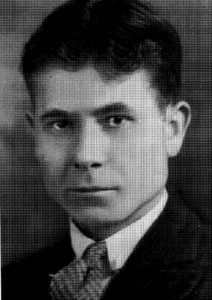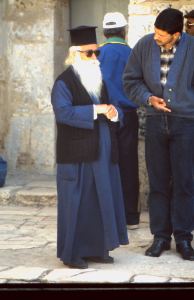Recently, one of my former elders called me and asked, “How’s the job search going?” I know he meant well, but we’ve gone round and round in the past about the difference between a “job” and a “calling.” A job pays the bill. In High School I cut fish for a living. It was my first job and, since I don’t have a sense of smell, I was ideally equipped for it. On the other hand, it was never my intension to spend the rest of my life hacking up halibut. I felt God had something else in mind for me.

My earliest memory is holding my Papa’s hand and climbing the stairs to Sunday School at the old 12th and Drexel church of Christ in Oklahoma City. Dad was in the Army in Korea and mom and my baby brother and I were living with my grandparents. I still have the card K.C. Moser gave my parents when I was born. From the earliest age, I wanted to be a preacher. Ministers were my heroes. Still I was mesmerized by those giants of old who so authoritatively preached the word. That’s what I wanted to be when I grew up! That was what God was calling me to do.
“I’m sending out resumes,” I answered, but what I am really doing is listening to stories – the stories of congregations around the country and I am worried. Not that I won’t be called to another church, but I am worried about the church itself.
“The average age here is 70,” he said as I listened. “We’re all getting up there so we need to do something quick!”
“And what do you feel like you need at X street?” I asked.
“Well, we’re going to hire a youth minister and we’re looking for a young man with a family to fill the pulpit,” he answered. I sighed and resisted the urge to ask, “And how many young people are there for that Youth Minister to minister to?”
Congregation after congregation believes the key is to hire someone young. “That’ll attract young families!” I hear over and over again. “If we add a contemporary service, the young people will come back!” They conclude. I had a vision of a bunch of 70-year old rockers with electric guitars and pounding drums – and shuddered.
Changing the music is probably a good idea in a lot of churches, but I don’t believe adding a band or a Youth Minister for that matter is the key to growing a church.
“Well, Brother McKeel, what do you think the key is?”
“Please, just call me John.” I said.
It’s no more about adding music and changing the role of women than it was about Pre-Millennialism, Cooperation, Speaking in Tongues or the Discipleship Movement in days gone by. There will always be a new program and there will always be a new controversy that threatens to divide us. A new program or a new method will not “save the church.”
“The Bible is the key,” I replied. “Jesus warned the Scribes, ‘Woe to you experts in the law, because you have taken away the key to knowledge.’ (Luke 11:52) The Bible is the key!”
I got a puzzled look and he stammered, “But we preach the Bible!”
“Yes, but do you make it come alive?” I asked. “No one has the right to make the Bible boring! I know a lot of preachers who try, but the Word must be ‘living and active’ not ‘dead and dull.’”
“Our preacher works very hard to have a lesson that is strong on application,” he protested.
“I’m sure he does,” I answered. “But Preaching ‘Six Steps to a Happy Life’ isn’t going to change the world. Many of the sermon outlines I see look like a kidnapper’s ransom note,” I observed. “Six points with six Scriptures cut out of different contexts to prove a point. That’s not listening to God. That’s just cutting out passages and pasting them into your outline to prove your point. Your preacher may make a wonderful point, but he needs to let the text dictate the outline instead of using the text to illustrate his conclusions.”
[Think about that for a moment. On the one hand we begin with God (observation), study very hard to know what the text is saying (interpretation) and then apply it (application). On the other hand we begin with our application in mind and try to find supporting quotes for it from different, often unrelated, passages of Scripture. Those are two very different approaches to my mind.]
I got a sharp glance down a very long nose. “And what is preaching in your opinion?”
“Story-telling.”
I let that sink in. “A rabbi once said, ‘God loves a good story. That’s why He created people.’”
Think about it. The first rule of good preaching is “Never yawn during your own sermon.” I’ve learned the way to hold people’s attention is by telling a good story and no story is better than the ones that come from the Good Book. First are the Bible Biographies. Yes, everyone may have heard the story of David and Goliath, but who tires of it let alone the stories of Abraham, Isaac and Jacob; the Beggar at the Golden Gate; the Philippian Jailer – the prophets, the apostles – the list is nearly endless and the lessons are just as applicable today as they were when the Holy Spirit chose to include them in the Bible.
But suppose we do tire of those stories. We can move on to the stories Jesus told: the Good Samaritan, the Prodigal Son, the Story of the Soils. And what happens when you get bored with those? Then let’s open up a text and make it come alive! Preachers need to learn the art of exegesis again. People are spell-bound and lives are changed when the letters of Paul, Peter, James and John are opened. When was the last time you heard a book brought to life from beginning to end? That’s preaching!
And the beautiful part of this plan is: The Bible touches everyone – old and young alike! Preaching on current events is divisive. Preaching pop psychology or even common sense won’t touch everyone. Using multi-media is clever, often entertaining, but it doesn’t begin to change lives unless it is used to open up the Scriptures.
Let’s get back to the Word of God. Let’s stand in awe and listen! If we are going to survive, much less grow, we need preachers.




